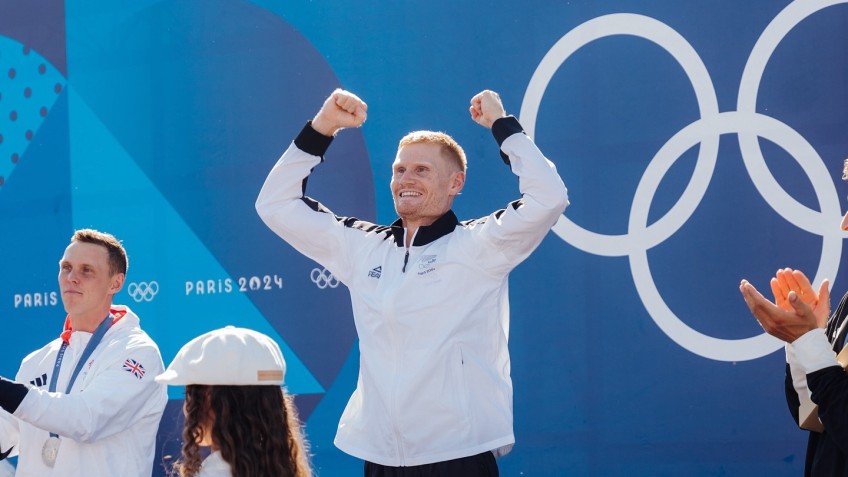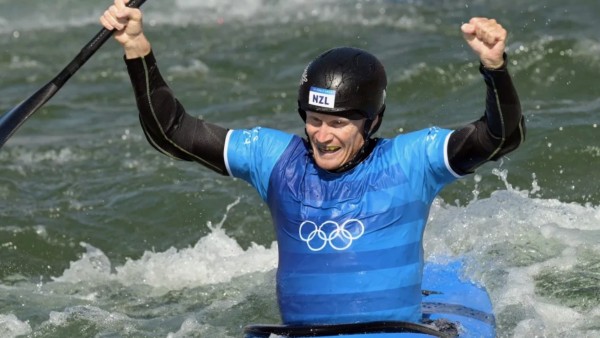Finn Butcher: 'It's crazy, I still can't even comprehend it'

By Dana Johannsen of RNZ in Paris
As he was launched off a two-metre ramp and into Vaire-sur-Marne white water course, New Zealand's Finn Butcher, a first-time Olympian, in a first-time Olympic sport known as a demolition derby on water, was on a collision course with history.
The 29-year-old paddler clinched the first ever kayak cross Olympic gold medal in Paris overnight with a thrilling win over British veteran Joe Clarke - considered the standard bearer of the new discipline - in the final.
Earlier in the week he felt like he had blown a big opportunity when he missed a place in the final of the canoe slalom - the more traditional of the Olympic white water events.
He was determined he would not miss his moment in the kayak cross.
Through each of the rapid-fire final rounds, in which kayakers, grouped in heats of four, race each other down the manmade course, Butcher looked aggressive and confident.
The unheralded New Zealander won his quarterfinal with a dominant display down the course, managing to avoid any tangles with other paddlers. He then comfortably took out second place in the semifinal.
And so onto the final. Or the "big final" as its called in kayak cross.
As he sat on the ramp, waiting to be pitched into the white water below, the 29-year-old paddler knew he had to bring big final energy.
After winning the start, Butcher powered his way down the course to clinch the first ever gold medal awarded in the event.
British veteran Joe Clarke claimed silver while Germany's Noah Hegge took out the bronze.
"I wanted to be up on the ramp and have a lot of intent and go as hard as I could as soon as I landed," Butcher said of his powerful start.
"In the final I probably didn't have the ideal lane, and I think Joe and Noah had a wee bit of a tussle and honestly it takes one stroke probably and I managed to get in front and held it from there."
Charging through the finish line to take out the win, Butcher looked back behind him as if he could scarcely believe he won.
After a pregnant pause, the Alexandra kayaker raised his arms in the air and celebrated wildly as his achievement sunk in.
"It's crazy, I still can't even comprehend it," an emotional Butcher said, gazing at the gold medal around his neck.
"As I exited the last upstream I was alone in front. It was wild, I just had this massive adrenaline dump, I think I'm still processing it."

The adrenaline flows for Finn Butcher (Image: RNZ/Bertrand Guay/AFP).
Adrenaline is what the sport's leaders were counting on when kayak cross was included in the Olympics programme for Paris as part of a shift by the International Olympic Committee (IOC) to include more youth oriented action sports in the Games.
Grouped in heats of four, the kayakers plunge off a ramp more than two metres above the water and fight their way down the course. Along the way there are two upstream and two downstream gates for the paddlers to navigate, all the while being bunted out of the way by their rivals.
The additional slalom event was added to the schedule at the expense of one of the canoe sprint races, the K1 200m - an event dominated by Dame Lisa Carrington since she won her first world title in the distance in 2011.
While it has meant Carrington will not get the opportunity to chase a fourth consecutive Olympic gold in the distance in Paris, the new event still presented a strong opportunity for New Zealand to cash in on the medal front.
Both Butcher and women's exponent Luuka Jones, who finished a heartbreaking fifth in the women's event overnight, promised in the lead-up that the exciting new discipline played into the strengths of New Zealand paddlers. It represented a return to their roots - the days spent knocking about in plastic canoes on the river.
Butcher said his results leading up to the Olympics also gave him confidence.
"I had some good results early on in the season, I was third in the first World Cup and sixth in the next one, so I knew I could battle with the top guys and once you're in the semi and in the final, anything can happen from there."
'It hurts - Jones
One of the first to greet Butcher as he came off the course was his long-time friend and training partner Jones, who only minutes earlier endured the heartbreak of missing out on the final in the women's event after her second placed finish in the semifinal was downgraded to fourth due to a fault at one of the gates.
She went on to win the "small final", putting her in fifth place overall. Small final, small consolation.
Jones, who in Paris became the third New Zealand woman behind Barbara Kendall and Dame Valerie Adams to compete in five Olympics, was devastated she could not pull off the fairytale ending to her Olympic career.
"It was I guess a silly mistake that led to a really big error, and I will be thinking about it for a long time. I'll be thinking about the what-ifs," Jones said of the fault at gate five that cost her a place in the semifinal.
"I've dreamt of standing on that Olympic podium for a long time and to not ever have that chance again, it hurts."
As Jones lamented her missed opportunity, she watched on with New Zealand media in the mixed zone while Butcher seized his.
"This is so huge for our sport," she said, fighting back tears her teammate crossed the finish line.
"I can't believe he's done it. I'm so proud of him."
Later, as Butcher basked in the glow of a dream result in Paris, Butcher took time to to reflect some of that glow back on Jones.
"She has been the gold standard of preparation, of executing when it matters and for us to follow in her footsteps is pretty special. As much as we celebrate me winning this, she has to be celebrated for everything she has done in the sport."
Main image (Facebook/The NZ Team): Finn Butcher with his kayak cross gold medal.





















